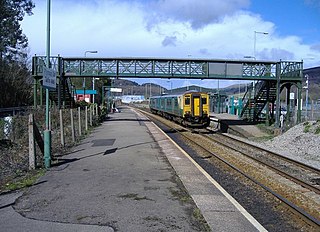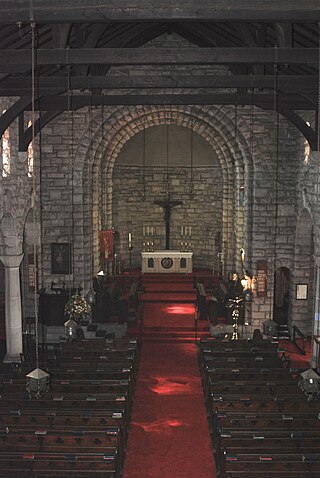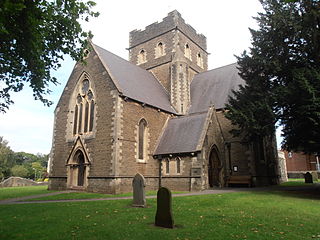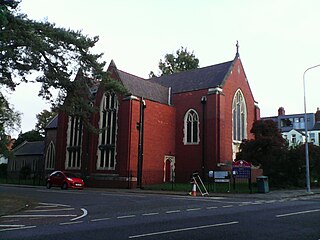
Whitchurch is a suburb and community in the north of Cardiff, capital of Wales. It is approximately 3 miles north of the centre of the city on the A470 road and A4054 road. It falls within the Whitchurch & Tongwynlais ward. The population of the community in 2011 was 14,267.

Ely is a district and community in Cardiff, Wales. It is to the north of Cowbridge Road West. Caerau defines the boundary to the south as does River Ely to the east and in part to the north.

Taff's Well is a semi-rural village, community and electoral ward located at the south easterly tip of Rhondda Cynon Taf, 6 miles (9.7 km) to the north of Cardiff, the capital city of Wales. Known locally as the 'Gates to the Valleys', it is separated from Gwaelod-y-Garth by the River Taff. Taff's Well is distinguished because it contains the only thermal spring in Wales. The tepid water is thought to rise along a fault-line from the Carboniferous Limestone, in somewhat similar manner to the warm springs at Bristol and Bath. Various religious groups regard it as a spiritual site.

The Diocese of Llandaff is an Anglican diocese that traces its roots to pre-Reformation times as heir of a Catholic bishopric. It is headed by the Bishop of Llandaff, whose seat is located at the Cathedral Church of Saint Peter and Saint Paul in Llandaff, a suburb of Cardiff. It currently covers most of the former Welsh county of Glamorgan, but once stretched from the River Towy to the middle of the Wye Valley.

A tin tabernacle, also known as an iron church, is a type of prefabricated ecclesiastical building made from corrugated galvanised iron. They were developed in the mid-19th century initially in the United Kingdom. Corrugated iron was first used for roofing in London in 1829 by civil engineer Henry Robinson Palmer, and the patent was later sold to Richard Walker who advertised "portable buildings for export" in 1832. The technology for producing the corrugated sheets improved, and to prevent corrosion, the sheets were galvanised with a coating of zinc, a process developed by Stanislas Sorel in Paris in the 1830s. After 1850, many types of prefabricated buildings were produced, including churches, chapels and mission halls.

The Community of the Resurrection (CR) is an Anglican religious community for men in England. It is based in Mirfield, West Yorkshire, and has 14 members as of April 2023. The community reflects Anglicanism in its broad nature and is strongly engaged in the life of the Anglican Communion. It also has a long tradition of ecumenical outlook and practice.

Caerau is a community in the west of Cardiff, capital city of Wales. Often considered part of Wenvoe by gully, Heol Trelai is the main road or avenue, lined with large trees. Dominated mostly by private housing, it has the Western Leisure Centre, supermarkets, schools and churches.

St Boniface Church is the mother church of the Anglican parish of Germiston, Gauteng which also includes the chapelries of St Mary and St John in Lambton, and St Mark in Rosedeep. The parish is part of the Diocese of the Highveld, which is in turn part of the Anglican Church of Southern Africa.
The Cardiff Deanery is a Roman Catholic deanery in the Archdiocese of Cardiff that oversees several churches in the city of Cardiff. It replaced the previous Cardiff East Deanery and Cardiff West Deanery, combining the two into one. The dean is centred at the Parish of St Mary's Canton.

St Mary the Virgin Church is a deconsecrated and ruined church in the parish of Caerau with Ely, Cardiff, Wales. It was built in the 13th century on a Roman encampment and closed for the last time in 1973.
The Church of St. Charles Borromeo is a Roman Catholic parish church under the authority of the Roman Catholic Archdiocese of New York, located in Dover Plains, Dutchess County, New York. It was founded in 1866 as a mission of Immaculate Conception Parish of Amenia. In 1885 it became a mission of St. John the Evangelist's Church in Pawling, and was finally itself elevated to parish status in 1936.

Caerau Hillfort is a large triangular multivallate Iron Age hillfort, built on a previously occupied Neolithic site, occupying the western tip of an extensive ridge-top plateau in the western suburbs of Caerau and Ely, Cardiff, Wales. It is the largest Iron Age site of its type in south Wales and also one of the largest in Great Britain. The old parish church, St Mary's, and a small ringwork, almost certainly a medieval castle site probably contemporary with the church, stand within the hillfort on the north-eastern side.

St Margaret's Church is a nineteenth-century Church in Wales parish church in the suburb of Roath, Cardiff, Wales. It includes the mausoleum of the Marquises of Bute.

St Edward's Church is a Church in Wales church in Penylan, Cardiff, South Wales. It is a daughter church of St Margaret's Church, Roath, the only one remaining in use after the closure of St Anne's in 2015.

The Church of St Andrew and St Teilo is a Church in Wales church, located in Cathays, Cardiff. In 2020 the church was relaunched as Citizen Church, with a mission to serve students and young professionals.

St Saviour's Church is a Church in Wales church in Splott, Cardiff, South Wales.

St Catwg's Church, Gelligaer is a Listed place of worship in the community of Gelligaer in Caerphilly, South Wales.
















